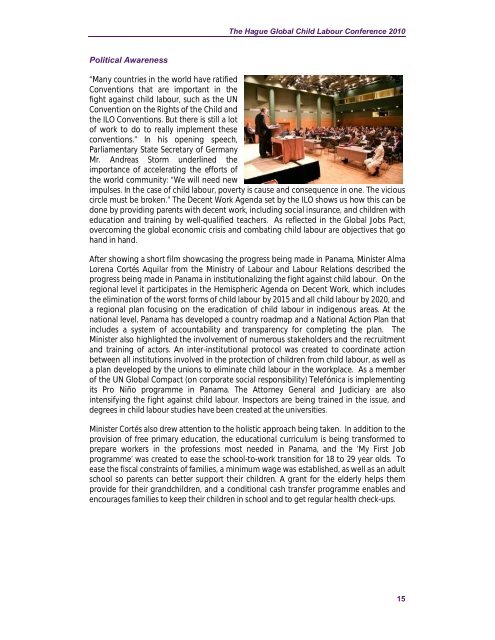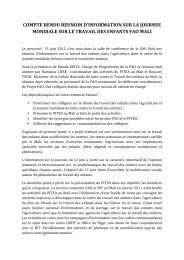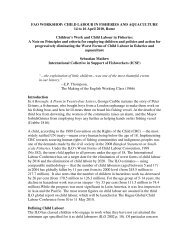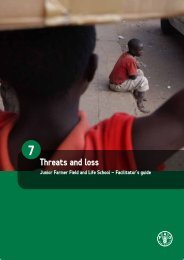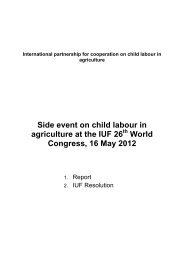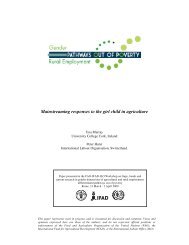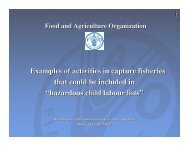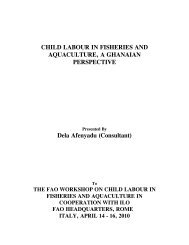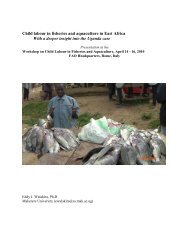The Hague Global Child Labour Conference 2010 - Food ...
The Hague Global Child Labour Conference 2010 - Food ...
The Hague Global Child Labour Conference 2010 - Food ...
You also want an ePaper? Increase the reach of your titles
YUMPU automatically turns print PDFs into web optimized ePapers that Google loves.
<strong>The</strong> <strong>Hague</strong> <strong>Global</strong> <strong>Child</strong> <strong>Labour</strong> <strong>Conference</strong> <strong>2010</strong>Political Awareness“Many countries in the world have ratifiedConventions that are important in thefight against child labour, such as the UNConvention on the Rights of the <strong>Child</strong> andthe ILO Conventions. But there is still a lotof work to do to really implement theseconventions.” In his opening speech,Parliamentary State Secretary of GermanyMr. Andreas Storm underlined theimportance of accelerating the efforts ofthe world community: “We will need newimpulses. In the case of child labour, poverty is cause and consequence in one. <strong>The</strong> viciouscircle must be broken.” <strong>The</strong> Decent Work Agenda set by the ILO shows us how this can bedone by providing parents with decent work, including social insurance, and children witheducation and training by well-qualified teachers. As reflected in the <strong>Global</strong> Jobs Pact,overcoming the global economic crisis and combating child labour are objectives that gohand in hand.After showing a short film showcasing the progress being made in Panama, Minister AlmaLorena Cortés Aquilar from the Ministry of <strong>Labour</strong> and <strong>Labour</strong> Relations described theprogress being made in Panama in institutionalizing the fight against child labour. On theregional level it participates in the Hemispheric Agenda on Decent Work, which includesthe elimination of the worst forms of child labour by 2015 and all child labour by 2020, anda regional plan focusing on the eradication of child labour in indigenous areas. At thenational level, Panama has developed a country roadmap and a National Action Plan thatincludes a system of accountability and transparency for completing the plan. <strong>The</strong>Minister also highlighted the involvement of numerous stakeholders and the recruitmentand training of actors. An inter-institutional protocol was created to coordinate actionbetween all institutions involved in the protection of children from child labour, as well asa plan developed by the unions to eliminate child labour in the workplace. As a memberof the UN <strong>Global</strong> Compact (on corporate social responsibility) Telefónica is implementingits Pro Niño programme in Panama. <strong>The</strong> Attorney General and Judiciary are alsointensifying the fight against child labour. Inspectors are being trained in the issue, anddegrees in child labour studies have been created at the universities.Minister Cortés also drew attention to the holistic approach being taken. In addition to theprovision of free primary education, the educational curriculum is being transformed toprepare workers in the professions most needed in Panama, and the ‘My First Jobprogramme’ was created to ease the school-to-work transition for 18 to 29 year olds. Toease the fiscal constraints of families, a minimum wage was established, as well as an adultschool so parents can better support their children. A grant for the elderly helps themprovide for their grandchildren, and a conditional cash transfer programme enables andencourages families to keep their children in school and to get regular health check-ups.15


